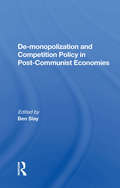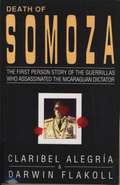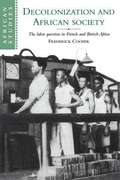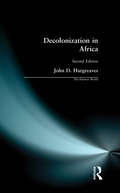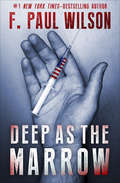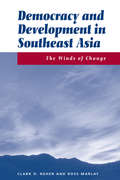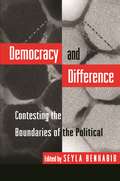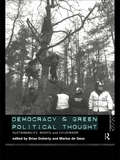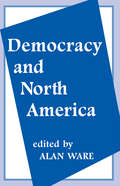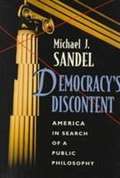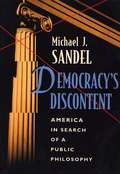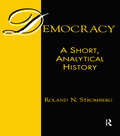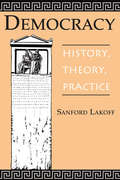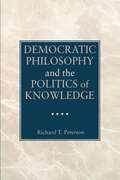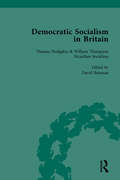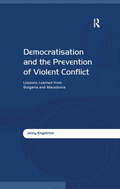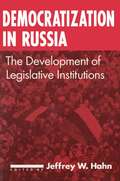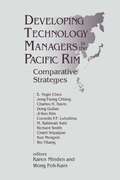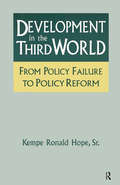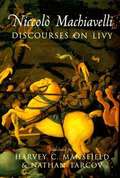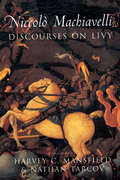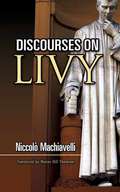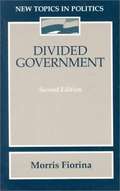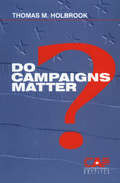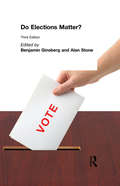- Table View
- List View
De-monopolization And Competition Policy In Post-communist Economies
by Ben SlayEven in developed capitalist economies, markets function poorly without regulation by competitive forces. The countries that once were part of the Eastern bloc are introducing market forces into industries created according to the monopolistic logic of central planning, so that competition policy plays an important role in the transition to capitalism. This interdisciplinary study examines how barriers to the development of competitive markets and competition policy are being overcome in Russia, Poland, Hungary, and Mongolia. A group of U.S., Russian, and East European specialists explores the institutions and programs of competition policy as well as its role in the overall post-Communist transition. Providing a complete, comparative picture of the development of competition policy in a broad cross section of formerly socialist countries, the contributors consider the extent of the post-Communist monopoly problem as well as progress in de-monopolization.
Death of Somoza: The First-person Story of the Guerrillas Who Assassinated the Nicaraguan Dictator
by Claribel Alegría Darwin J. FlakollDeath of Somoza reveals the inside story of the assassination of Somoza in Asuncion, Paraguay in 1980. Alegria and Flakoll, on the recommendation of Julio Cortazar, met "Ramon," a leader in the Argentinian Revolutionary Workers' Party (PRT) and with his help were able to interview all the survivors of the commando team that carried out the "bringing to justice" of Somoza. Alegria and Flakoll then rewove these testimonies into a narrative that reads like a thriller, as well as giving a vivid picture of the political and social climate of the time. Enlivened by its colorful cast of characters, Death of Somoza is the definitive account of how Anastasio Somoza Debayle was brought to justice. This story is not an apology for terrorism, but rather the chronicle of a tyrannicide.
Decolonization and African Society: The Labor Question In French and British Africa (African Studies #89)
by Frederick CooperThis detailed and authoritative volume changes our conceptions of 'imperial' and 'African' history. The author gathers a vast range of archival sources in French and English to achieve a truly comparative study of colonial policy toward the recruitment, control, and institutionalization of African labor forces from the mid 1930s, when the labor question was first posed, to the late 1950s, when decolonization was well under way. The author explores colonial conceptions of the African worker and shows how African trade union and political leaders used the new language of social change to claim equality and a share of power. This helped to persuade European officials that the 'modern' Africa they imagined was unaffordable. Britain and France could not reshape African society. As they left the continent, the question was how they had affected the ways in which Africans could reorganize society themselves.
Decolonization in Africa (The Postwar World)
by John D. HargreavesJohn Hargreaves examines how the British, French, Belgian, Spanish and Portuguese colonies in tropical Africa became independent in the postwar years, and in doing so transformed the international landscape. African demands for independence and colonial plans for reform - central to the story - are seen here in the wider context of changing international relationships.
Deep as the Marrow
by F. Paul WilsonThe New York Times–bestselling author of The Select “combines medical and political intrigue into one explosive, warp-speed thriller” (Douglas Preston). To end the war on drugs, the president of the United States decides to legalize narcotics—and tax them heavily. Some think he’s crazy. Others want him dead. The president’s personal physician, John Van Duyne, took an oath to do no harm, but after a Colombian drug lord kidnaps his six-year-old daughter, he’s forced to do the unthinkable to save her: poison the president.
Democracy And Development In Southeast Asia: The Winds Of Change
by Clark NeherExploring the remarkable political and economic changes sweeping Southeast Asia, the authors take as their starting point the trend,albeit uneven,toward democratization. They focus specifically on Asian democracy,'" a form that has been adapted by Southeast Asians to suit their own particular needs.This book begins by building a framework for understanding democracy in its broadest sense. The authors investigate the uniquely Asian style of democracy, which borrows democratic political institutions and meshes them with the cultural patterns specific to each country. In separate chapters, the authors trace the evolutionary historical processes within each country, as well as citizen participation, electoral practices, and civil liberties. The chapters end with an assessment of the prospects for democracy in that nation as well as an evaluation of whether democratic regimes are necessary for developing successful economies and societies in the new international era.
Democracy and Difference: Contesting the Boundaries of the Political
by Seyla BenhabibThe global trend toward democratization of the last two decades has been accompanied by the resurgence of various politics of "identity/difference." From nationalist and ethnic revivals in the countries of east and central Europe to the former Soviet Union, to the politics of cultural separatism in Canada, and to social movement politics in liberal western-democracies, the negotiation of identity/difference has become a challenge to democracies everywhere. This volume brings together a group of distinguished thinkers who rearticulate and reconsider the foundations of democratic theory and practice in the light of the politics of identity/difference. In Part One Jürgen Habermas, Sheldon S. Wolin, Jane Mansbridge, Seyla Benhabib, Joshua Cohen, and Iris Marion Young write on democratic theory. Part Two--on equality, difference, and public representation--contains essays by Anne Phillips, Will Kymlicka, Carol C. Gould, Jean L. Cohen, and Nancy Fraser; and Part Three--on culture, identity, and democracy--by Chantal Mouffe, Bonnie Honig, Fred Dallmayr, Joan B. Landes, and Carlos A. Forment. In the last section Richard Rorty, Robert A. Dahl, Amy Gutmann, and Benjamin R. Barber write on whether democracy needs philosophical foundations.
Democracy and Green Political Thought: Sustainability, Rights and Citizenship (Routledge/ECPR Studies in European Political Science)
by Brian Doherty Marius De GeusThe green movement has posed some tough questions for traditional justifications of democracy. Should the natural world have rights? Can we take account of the interests of future generations? But questions have also been asked of the greens. Could their idealism undermine democracy? Can greens be effective democrats?In this book some of the leading writers on green political thought analyze these questions, examining the discourse of green movements concerning democracy, the status of democracy within green political thought and the political institutions that might be necessary to ensure democracy in a sustainable society.
Democracy and North America
by Alan WareThe contributions here consider a number of themes and issues which account for the successful democratization of the United States and Canada and offer an analysis of the reasons for the absence of democratization in Mexico.
Democracy's Discontent: America in Search of a Public Philosophy
by Michael J. SandelThe defect, Sandel maintains, lies in the impoverished vision of citizenship and community shared by Democrats and Republicans alike. American politics has lost its civic voice, leaving both liberals and conservatives unable to inspire the sense of community and civic engagement that self-government requires. In search of a public philosophy adequate to our time, Sandel ranges across the American political experience, recalling the arguments of Jefferson and Hamilton, Lincoln and Douglas, Holmes and Brandeis, FDR and Reagan. He relates epic debates over slavery and industrial capitalism to contemporary controversies over the welfare state, religion, abortion, gay rights, and hate speech. Democracy's Discontent provides a new interpretation of the American political and constitutional tradition that offers hope of rejuvenating our civic life.
Democracy's Discontent: American in Search of a Public Philosophy
by Michael J. SandelDespite the success of American life in the last half-century—unprecedented affluence, greater social justice for women and minorities, the end of the Cold War—our politics is rife with discontent. Americans are frustrated with government. We fear we are losing control of the forces that govern our lives, and that the moral fabric of community—from neighborhood to nation—is unraveling around us. What ails democracy in America today, and what can be done about it? Democracy’s Discontent traces our political predicament to a defect in the public philosophy by which we live. In a searching account of current controversies over the role of government, the scope of rights and entitlements, and the place of morality in politics, Michael Sandel identifies the dominant public philosophy of our time and finds it flawed. The defect, Sandel maintains, lies in the impoverished vision of citizenship and community shared by Democrats and Republicans alike. American politics has lost its civic voice, leaving both liberals and conservatives unable to inspire the sense of community and civic engagement that self-government requires. In search of a public philosophy adequate to our time, Sandel ranges across the American political experience, recalling the arguments of Jefferson and Hamilton, Lincoln and Douglas, Holmes and Brandeis, FDR and Reagan. He relates epic debates over slavery and industrial capitalism to contemporary controversies over the welfare state, religion, abortion, gay rights, and hate speech. Democracy’s Discontent provides a new interpretation of the American political and constitutional tradition that offers hope of rejuvenating our civic life.
Democracy: A Short, Analytical History
by Roland N. StrombergThis text sums up the democratic experience in modern Western civilisation. It defines the term and notes the confusions in it, and its changing meanings over the past two centuries or so. It records criticisms, and is especially concerned with the conditions that are neccessary for it to exist. This encompasses a comprehensive literature which the author seeks to summarise and present to the reader in accessible form. It is appropriate material for course reading in Westen civilisation, intellectual history, political thought, and philosophy.
Democracy: History, Theory, Practice
by Sanford Lakoff<p>Written with remarkable erudition and clarity, this text is the most comprehensive introduction to democracy available in a single volume. Tocquevillian in its scope and historical-philosophical in its orientation, Democracy traces popular government from its classical origins through the authoritarian and totalitarian backlash of the twentieth century. <p>Unified by the theme of democracy as autonomy—communal, plural, and individual—the study examines democratic government and politics in normative, institutional, and procedural terms.Students of democracy will find this book especially valuable for its account of the democratic ideal as a concept in the history of political thought, ranging from Athenian direct democracy and Roman republicanism to liberal democracy. <p>Showing the interplay of theory and practice, Lakoff analyzes the character of modern democracy, or “compound autonomy,” as expressed in voting and electoral systems, federalism, and efforts of democratization around the world. His synthesis leads to the conclusion that although democracy is neither perfect nor inevitable, it is humanity's best hope.</p>
Democratic Philosophy and the Politics of Knowledge (G - Reference, Information and Interdisciplinary Subjects)
by Richard T. PetersonDebates over postmodernism, analyses of knowledge and power, and the recurring issue of Heidegger's Nazism have all deepened questions about the relation between philosophy and the social roles of intellectuals. Against such postmodernist rejections of philosophical theory as mounted by Rorty and Lyotard, Richard Peterson argues that precisely reflection on rationality, in appropriate social terms, is needed to confront urgent political issues about intellectuals. After presenting a conception of intellectual mediation set within the modern division of labor, he offers an account of postmodern politics within which postmodern arguments against critical reflection are themselves treated socially and politically.Engaging thinkers as diverse as Kant, Hegel, Marx, Habermas, Foucault, and Bahktin, Peterson argues that a democratic conception and practice of philosophy is inseparable from democracy generally. His arguments about modern philosophy are tied to claims about the relation between liberalism and epistemology, and these in turn inform an account of impasses confronting contemporary politics. Historical arguments about the connections between postmodernist thought and practice are illustrated by discussions of the postmodernist dimensions of recent politics.
Democratic Socialism in Britain: Classic Texts in Economic and Political Thought, 1825-1952
by David ReismanThe texts in this collection of 10 volumes demonstrate both the diversity and continuity in British theories of democratic socialism. The selection encompasses the Ricardian socialists, the Christian socialists, and the Fabian socialists. Volume 1 includes ‘Labour Rewarded and ‘Labour Defended’.
Democratisation and the Prevention of Violent Conflict: Lessons Learned from Bulgaria and Macedonia
by Jenny EngströmChallenging the often held belief that democratization necessarily leads to aggressive ethnic nationalism and even violent conflict, this book offers an alternative account of democratization and inter-ethnic relations. It suggests that democratization can in fact help to prevent violent conflict in divided societies, as demonstrated by two case studies: Bulgaria and Macedonia. At a time when democracy promotion is increasingly becoming part of international relations and foreign policy, this study offers some poignant lessons for democratization and conflict resolution in places such as Iraq, Afghanistan and Israel/Palestine to name but a few.
Democratization in Russia: The Development of Legislative Institutions
by Jeffrey W. HahnThe development of Russian democracy has been a gradual process of maturation punctuated by dramatic events. This text examines events such as the first free elections, the Russian parliament's resistance to the 1991 coup, and the bloody confrontation with the military in 1993.
Developing Technology Managers in the Pacific Rim: Comparative Strategies
by Karen Minden Wong Poh KamOffering an approach outside the mainstream of Management of Technology (MOT) thought, the objective of this text is to inform decision-makers, policy-makers and educators/students about the range of management technology, policies and programmes in each region.
Development in the Third World: From Policy Failure to Policy Reform
by Kempe Ronald Hope, Sr.First Published in 1996. Routledge is an imprint of Taylor & Francis, an Informa company.
Discourses on Livy
by Niccolo Machiavelli Harvey C. Mansfield Nathan TarcovA commentary on Titus Livius's (Livy's) work on Roman History, "The Discourses on Livy" is Niccolo Machiavelli's examination of the structure and benefit of the republic. Considered the most important work on the subject of republicanism in the early modern era, "The Discourses on Livy" are comprised of three books. In the first book Machiavelli discusses the internal structure of a republic. In the second book he discusses matters of warfare and in the third his attention is turned to matters of individual leadership. An important work of political history and philosophy, "The Discourses on Livy" are a must read for any student of political science.
Discourses on Livy
by Niccolò MachiavelliDiscourses on Livy is the founding document of modern republicanism, and Harvey C. Mansfield and Nathan Tarcov have provided the definitive English translation of this classic work. Faithful to the original Italian text, properly attentive to Machiavelli's idiom and subtlety of thought, it is eminently readable. With a substantial introduction, extensive explanatory notes, a glossary of key words, and an annotated index, the Discourses reveals Machiavelli's radical vision of a new science of politics, a vision of "new modes and orders" that continue to shape the modern ethos. "[Machiavelli] found in Livy the means to inspire scholars for five centuries. Within the Discourses, often hidden and sometimes unintended by their author, lie the seeds of modern political thought. . . . [Mansfield and Tarcov's] translation is careful and idiomatic."—Peter Stothard, The Times "Translated with painstaking accuracy—but also great readability."—Weekly Standard "A model of contemporary scholarship and a brave effort at Machiavelli translation that allows the great Florentine to speak in his own voice."—Choice
Discourses on Livy (Mobi Classics Ser.)
by Ninian Hill Thomson Niccolò MachiavelliThe strategies Machiavelli developed and endorsed in The Prince made his name an enduring synonym for the ruthless acquisition and use of power. Discourses on Livy, published in 1531, is equally essential to an understanding of political theory. Both treatises compare the government of ancient Rome to that of the Italian Renaissance. The Prince, however, offers advice on maintaining a monarchy; with Discourses, Machiavelli considers the structure and benefits of a republic.Inspired by Titus Livy's monumental history of Rome, Machiavelli discusses the internal structure of a republic, methods of conducting warfare, and the defining qualities of individual leadership. His explorations of the concept of checks and balances, the strength of a tripartite structure, and the superiority of a republic to a principality keep this book as relevant today as it was five centuries ago.
Divided Government
by Morris FiorinaDiscusses the issues of the three branches of the United States Government
Do Campaigns Matter?
by Dr Thomas M. HolbrookA thorough examination of the impact of campaign politics on presidential elections in the United States is presented in this book. Using actual election results and empirical evidence, the author also incorporates data on additional factors such as media coverage, the impact of nominating conventions on public opinion, presidential debates, and other events such as staff shake-ups, endorsements and scandals. In so doing, Holbrook develops a model for testing campaigns and proves how campaigns play a key role in shaping public opinion and, ultimately, influencing outcomes.
Do Elections Matter?
by Benjamin Ginsberg Alan StoneThis text provides an analysis of the variety of consequences that elections may have for the operation of American political institutions and the formulation and administration of policy.
